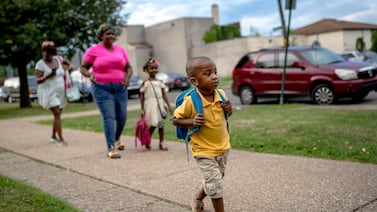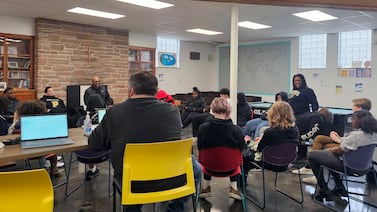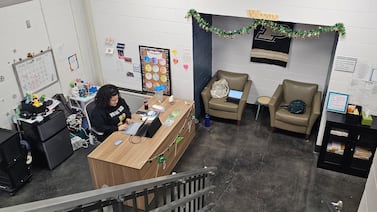School districts with high levels of poverty that lack counselors, social workers, and psychologists will now be able to recruit and hire more mental health professionals under a grant program offered by the state.
The push by state officials to address the shortage of mental health professionals in schools, and to increase the diversity among those professionals, is part of the latest effort to fund solutions to the ongoing youth mental health crisis. Some of those potential solutions, and the state funds to pay for them, are included in Gov. Phil Murphy’s $53.1 billion proposed budget that lawmakers are now reviewing.
The grant program is being run by the state Department of Education and is separate from the state’s proposed regional “hub-and-spoke” model that is currently being developed by the Department of Children and Families, according to Jason Butkowski, a spokesman for that department.
The regional model, known as the New Jersey Statewide Student Support Service Network, aims to provide mental health services to more students throughout the state and is intended to connect students to mental health services statewide, according to Butkowski. The grant program from the Department of Education and the regional model being developed by the Department of Children and Families will likely be complementary to each other, Butkowski said, and will be operating at the same time.
In October, the state announced its plan for the regional mental health services model, which will create 15 “hubs” or centers, in the state. The original proposal was designed to replace the current school-based youth services programs by June 30. The current service model has existed in 90 schools throughout the state since the late 1980s. After pushback from advocates, school officials, and state lawmakers, state officials said in November that they would continue to fund the school-based youth services program while building out the “hub-and-spoke” model.
Last month, the state announced the health care organizations that will staff and run the 15 regional hubs. The state has proposed staffing the hubs with three to 10 licensed clinicians per region.
“This is an administration that was going to destroy the school-based youth services program … at the same time they were trying to set up this other program,” Sen. Declan O’Scanlon (R-Monmouth), a member of the Senate Budget and Appropriations Committee, said. “So that right there screams incompetent to me. So I just don’t have a lot of faith that the folks in charge really know what they’re doing.”
200-plus NJ districts lack mental health professionals
The new grant program for school-based mental health services will span five years with more than $14 million going out to schools.
Efforts to create and maintain more robust systems of mental health support arrive as a youth mental health crisis continues to impact students across the state and country.
In 2021, 14% of surveyed Black high school students attempted suicide nationally, while 11% of Hispanic students, 9% of white students, and 6% of Asian American students also attempted suicide, according to a report released in February by the Centers for Disease Control and Prevention.
“Any impediments to a student’s ability to rectify emotional stresses he, she, or they may experience can provide an undue burden to the focus on educational progress,” Dr. Angelica Allen-McMillan, the acting commissioner of the Department of Education, said during a hearing in front of the Senate Budget and Appropriations Committee in April.
The new grant program is open to 203 boards of education the state Department of Education has identified as lacking in mental health professionals and where more than 20% of the student population receives free or reduced-cost lunches. The program also aims to increase the racial diversity of school counselors, psychologists, and social workers who are hired by the school districts.
Diversifying school counselors, social workers
“If we want to combat stigma and increase service usage in a really authentic way, then we really need to have service providers that not only care about the experiences of many young people, but also understand the communities from which they come,” said Kalisha Smith, a licensed clinical social worker and a clinical consultant with The Society for the Prevention of Teen Suicide.
It’s also important for young people to see service providers who may look, sound like, or believe like them, Smith said.
O’Scanlon said that the grant program is “a step in the right direction.”
The program comes at a time when there have been fewer mental health staff for Black students in New Jersey public schools and more for white students, according to a 2022 report from the New Jersey Policy Perspective think tank. In 2008, all public schools in New Jersey had, on average, 8.2 mental health staff per 1,000 students, according to the report. This number rose to 8.6 staff per 1,000 in 2020. During the same time, mental health staff per 1,000 white students rose from 7.4 to 8.5, the report noted.
In contrast, the numbers of mental health staff per 1,000 Black students decreased from 10.3 to 8.5 and from 9.0 to 8.4 per 1,000 for Hispanic students during the same time.
One of the school districts eligible to receive funding from the grant is Greater Egg Harbor Regional High School District in Atlantic County. The district, which includes Absegami, Cedar Creek, and Oakcrest high schools, has a diverse student population from urban, suburban, and rural communities, according to Jennifer Rushton, the director of curriculum, instruction, and assessment in the district.
From 2021 to 2022, the district enrolled 3,083 students, according to the Education Law Center, a nonprofit organization that advocates for equal educational opportunity. Of this number, 45% were white, 23% were Black, 22% were Latino, and 7% were Asian American. Additionally, 47% of students in the district were eligible for free or reduced-cost lunch.
“We definitely need the diversity, but it spans across every area of education,” said Rushton, who noted there is a need for diversity in every area of education, including among teachers in the classroom, guidance counselors at schools, and social workers and psychologists.
Access to mental health care for students in Atlantic County is “few and far between,” Rushton said. More funding to provide more resources “can make a world of difference,” she said.
Bobby Brier is a multimedia mental health reporter at NJ Spotlight News, where this story was first published. He focuses on underserved and rural communities throughout New Jersey via a partnership with Report for America. NJ Spotlight News is a content partner of Chalkbeat Newark.








